

Connected Superintendent. Data is a big deal.
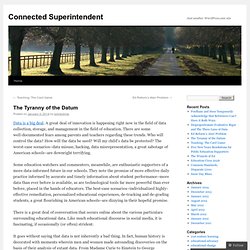
A great deal of innovation is happening right now in the field of data collection, storage, and management in the field of education. There are some well-documented fears among parents and teachers regarding these trends. Who will control the data? How will the data be used? Will my child’s data be protected? Some education watchers and commenters, meanwhile, are enthusiastic supporters of a more data-informed future in our schools. There is a great deal of conversation that occurs online about the various particulars surrounding educational data. It goes without saying that data is not inherently a bad thing. Data should indeed inform decisions. But data should come with some serious warnings, and we’ve seen just how bad things can get in education. 1. 2. 3. 4. More thoughts later on rules that should drive data so that data doesn’t drive us. Like this: Like Loading... Tried and True Mentor Texts for Coaching.
Teachers and coaches often ask us for a list of mentor texts to teach a particular strategy or genre unit of study.
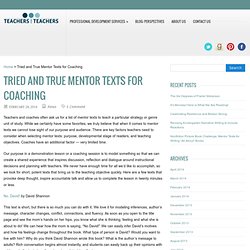
While we certainly have some favorites, we truly believe that when it comes to mentor texts we cannot lose sight of our purpose and audience. There are key factors teachers need to consider when selecting mentor texts: purpose, developmental stage of readers, and teaching objectives. Coaches have an additional factor — very limited time. Our purpose in a demonstration lesson or a coaching session is to model something so that we can create a shared experience that inspires discussion, reflection and dialogue around instructional decisions and planning with teachers. We never have enough time for all we’d like to accomplish, so we look for short, potent texts that bring us to the teaching objective quickly. Addressing Our Needs: Maslow Comes to Life for Educators and Students. In the mid-1950s, humanistic psychologist Abraham Maslow created a theory of basic, psychological and self-fulfillment needs that motivate individuals to move consciously or subconsciously through levels or tiers based on our inner and outer satisfaction of those met or unmet needs.
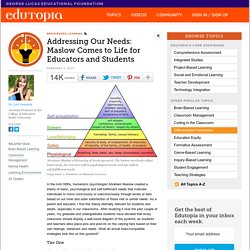
As a parent and educator, I find this theory eternally relevant for students and adults, especially in our classrooms. After studying it over the past couple of years, my graduate and undergraduate students have decided that every classroom should display a wall-sized diagram of the pyramid, as students and teachers alike place pins and post-its on the varying tiers based on their own feelings, behaviors and needs. What do actual brain-compatible strategies look like on this pyramid?
Tier One Meeting Physiological Needs in the Classroom These elements contribute to brain-compatible learning by creating a physical environment that is inviting, warm and friendly! Questions to Ask Myself What do I need? Tier Two. Celebrating Formative Assessment – the Verb! This week we are celebrating the act of assessing.
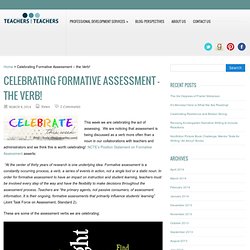
We are noticing that assessment is being discussed as a verb more often than a noun in our collaborations with teachers and administrators and we think this is worth celebrating! NCTE’s Position Statement on Formative Assessment asserts: “At the center of thirty years of research is one underlying idea: Formative assessment is a constantly occurring process, a verb, a series of events in action, not a single tool or a static noun. In order for formative assessment to have an impact on instruction and student learning, teachers must be involved every step of the way and have the flexibility to make decisions throughout the assessment process. Teachers are “the primary agents, not passive consumers, of assessment information. These are some of the assessment verbs we are celebrating: Assessment is more than a published test or tool that is administered formally.
Resources and Downloads for Differentiated Instruction. Tips for downloading: PDF files can be viewed on a wide variety of platforms -- both as a browser plug-in or a stand-alone application -- with Adobe's free Acrobat Reader program.
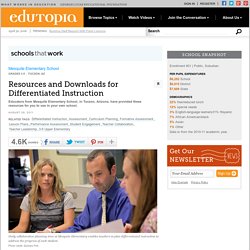
Click here to download the latest version of Adobe Reader. Click on any title link below to view or download that file. Resources On This Page: Lesson Plans & Rubric - Reteach and Enrich Sample materials used to teach, assess, reteach, and enrich one week's fifth grade math objective: differentiating prime and composite numbers. Back to Top Tools for Data Assessment Teachers at Mesquite meet weekly with the student achievement teacher to review the most recent assessment data and plan instruction for each student accordingly. 5th Grade Math Formative Assessment Tracking Sheet Sample spreadsheet used to track student performance on each objective.
Culture Websites & Readings.